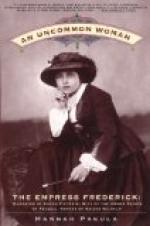And drawing from her finger the wedding-ring which her beloved husband had once placed upon it, she threw it into the foaming waves.
Bending down, she saw the ring sinking in the waters and murmured: “I greet thee, Ivan, I greet thee! Take my ring—forever am I thine!”
Then, rising proudly up, and stretching forth her arms toward heaven, she exclaimed aloud: “I now go to pray that God may send thee vengeance. Woe to Russia, woe!” and the stream with its boisterous waves howled and thundered after her the words: “Woe to Russia, woe!”
COUNT MUNNICH
The Empress Anna was dead, and—an unheard-of case in Russian imperial history—she had even died a natural death. Again was the Russian imperial throne vacated! Who is there to mount it? whom has the empress named as her successor? No one dared to speak of it; the question was read in all eyes, but no lips ventured to open for the utterance of an answer, as every conjecture, every expression, if unfounded and unfulfilled, would be construed into the crime of high-treason as soon as another than the one thus indicated should be called to the throne!
Who will obtain that throne? So asked each man in his heart. The courtiers and great men of the realm asked it with shuddering and despair. For, to whom should they now go to pay their homage and thus recommend themselves to favor in advance? Should they go to Biron, the Duke of Courland? Was it not possible that the dying empress had chosen him, her warmly-beloved favorite, her darling minion, as her successor to the throne of all the Russias? But how if she had not done so? If, instead, she had chosen her niece, the wife of Prince Anton Ulrich, of Brunswick, as her successor? Or was it not also possible that she had declared the Princess Elizabeth, the daughter of Czar Peter the Great, as empress? The latter, indeed, had the greatest, the most incontestable right to the imperial throne of Russia; was she not the sole lawful heir of her father? How, if one therefore went to her and congratulated her as empress? But if one should make a mistake, how then?
The courtiers, as before said, shuddered and hesitated, and, in order to avoid making a mistake, did nothing at all. They remained in their palaces, ostensibly giving themselves up to deep mourning for the decease of the beloved czarina, whom every one of them secretly hated so long as she was yet alive.
There were but a few who were not in uncertainty respecting the immediate future, and conspicuous among that few was Field-Marshal Count Munnich.
While all hesitated and wavered in anxious doubt, Munnich alone was calm. He knew what was coming, because he had had a hand in shaping the event.
“Oh,” said he, while walking his room with folded arms, “we have at length attained the object of our wishes, and this bright emblem for which I have so long striven will now finally become mine. I shall be the ruler of this land, and in the unrestricted exercise of royal power I shall behold these millions of venal slaves grovelling at my feet, and whimpering for a glance or a smile. Ah, how sweet is this governing power!




